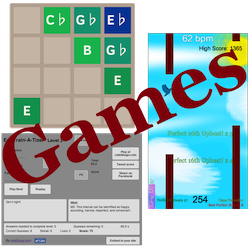What a wondrous age we live in: The iPod, iTunes, YouTube, Pandora, Rdio, Spotify, Facebook. Communication technology that is completely customizable to our own individual likings. Windows into the world that filter out everything that does not capture our interest. If we don’t like what we see or hear, we can delete it, turn it off, filter out similar content, and take control over what we perceive.

We’re finally getting what every person who has ever lived dreamed of: a life of complete control. A life where if we don’t appreciate something, we change it. It used to be that only kings and the very wealthy could decide what art they wanted to enjoy, and even then they had to wait for it to arrive. Today, if we want to see a Monet or hear a Beethoven, we just search for it and it is ready and waiting for our enjoyment. If we change our minds halfway through, no one is offended when we leave our private concert hall or gallery. We just push stop and we are happy again.
This mentality has begun to creep into the physical world too, but we’re getting used to it. Students sink into their communication technology kingdom during class. Friends text their digital subjects while spending time together in the uncontrollable physical world. Although employees may not own the world they’re being paid to occupy, they may continually visit a world they do own while on their shift. A father may not have control over his children, but if he lets his children build and rule their own worlds through communication technology, Daddy can get back to controlling his.
Some people may try to convince us that a personal and customizable life is not reality, but real life is generally determined by a conglomeration of experience. Digital life is real life in so far as it forms a part of this conglomeration. Digital life is not a different life, as many have tried to believe, it’s simply a different part of life–a powerful one that allows us to rule our own universe. No matter how much we attempt to separate the world we rule from the world in which we live, these two will always be intertwined.
But I’m outside of my field. I don’t understand the effects of the digital world on relationships and the like. I’m not a psychologist. I’m not a pastor or a priest. But I am an artist, and I’m very concerned about the consequences of digital life for people’s aesthetic wellness.
A sociologist’s (Sherry Turkle) views on the effects of communication technology.
See below for the rest of this essay.

For the most part, our communication technology kingdoms are only one part of our lives. We still have to travel, eat, sleep, participate in funerals and weddings, work on our houses, cut our grass, and the like. All of these things take place in a world outside of our control. We can’t help that the roof got old, we got tired, or we got hungry. But something we have gained almost inherent control of is the art we consume. For example, if we want to enjoy a fine meal, we either have to cook, pay for it, or let ourselves be at the mercy of a host. But if we want to listen to fine music, the Chicago symphony orchestra is at our disposal for no charge. Is it any coincidence that film, music, photography, and video games are the most popular forms of art? Our aesthetic world (at least for our favorite two senses) is completely under our digital control. Is it a simple coincidence that our favorite art forms give us complete control over our aesthetic environment, or is our preference shaped by our desire to be in control of our universe?
To answer these questions, it is important to realize that beauty’s existence does not depend on our perception. A sunset is beautiful, not because our minds project beautiful feelings onto it, but because it imprints its own beauty on our minds. Unfortunately, we have come under the notion that “beauty is in the eye of the beholder.” Friends, that’s just not biblical. This notion implies that man’s projection of his own beauty onto God’s creation makes God’s work worth enjoying. However, the creation account makes it abundantly clear that the world was beautiful before man even existed. This becomes very evident when God says of his creation, “It is very good.” No matter how passionately our proud eyes try to project our own beauty onto the world we behold, the fact remains that beauty goes into our minds and not out from them.
So then, how does complete control over our aesthetic environment affect our appreciation of beauty? Our aesthetic kingdoms are inclination amplifiers that cause us to gravitate even more strongly toward our hearts’ natural tendencies, but without accountability. They enable us to flippantly consume increasing amounts of what we enjoy without the bother of others’ insight. If beauty is defined by God, it is dangerous for us to gorge ourselves on object after object without another’s opinion about what we’re consuming. Ultimately, this leads to the most dangerous aesthetic wellness problem: letting ourselves consume only those aesthetic objects to which we are naturally inclined. The result is that we only consume art that aligns with our personal projections of beauty, while our projections slowly erode into aesthetic chaos. This is not God’s plan for our lives. God does not want us to beckon beauty and shape it with our minds; rather he wants our minds to be beckoned and shaped by beauty (Romans 12:1-8, Philippians 4:8, II Corinthians 3:18).
Finally, how does the complete control of our environment affect our community? Art is a tool to bring people together, but our communication technology kingdoms create reasons to keep people apart. Beckoning beauty through communication technology replaces aesthetic participation in our community. If we no longer need other people in order to be fed aesthetically, we won’t attend artistic community events. If no one attends, no one will create. This problem is compounded in light of our diminishing appreciation of beauty. Eventually everyone prefers his own narrow and unique brand of beauty and this drives us apart aesthetically. It’s naive to think the aesthetic world isn’t part of the real world. Aesthetic disconnection is a problem as real as any other. When we drift apart aesthetically, we drift apart. Plain and simple.

